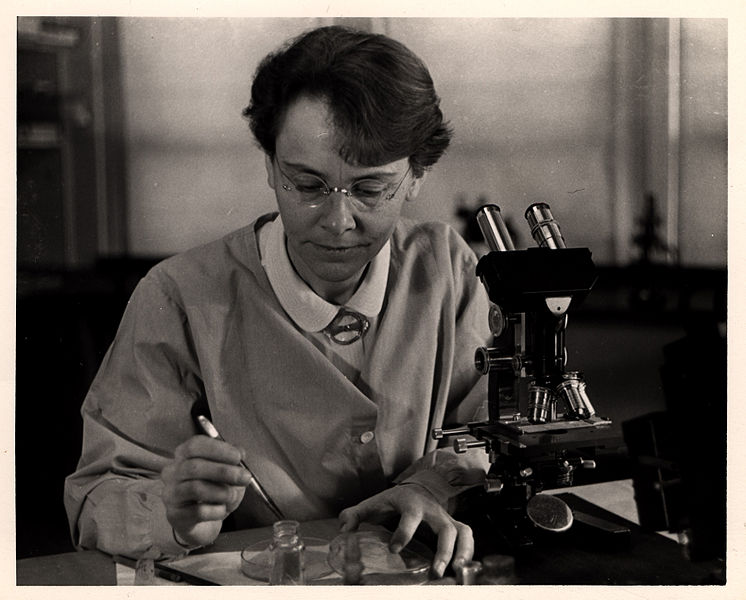Barbara McClintock
 Barbara McClintock (June 16 1902 – September 2 1992), is an American cytogeneticist. She won the 1983 Female Nobel Prize Laureates for her discovery of genetic transposition, or the ability of genes to change position on the chromosome.
Barbara McClintock (June 16 1902 – September 2 1992), is an American cytogeneticist. She won the 1983 Female Nobel Prize Laureates for her discovery of genetic transposition, or the ability of genes to change position on the chromosome.Education and early influences
McClintock began her studies at Cornell University’s College of Agriculture in 1919. She studied botany, graduating with a BSc in 1923. Her interest in genetics began in 1921, when she took a course on genetics taught by C. B. Hutchison. Recognising her talent, he invited her to participate in the graduate genetics course at Cornell in 1922. She was also enrolled in a cytology course given by Lester W. Sharp of the Department of Botany. His interests focused on the structure of chromosomes and their behaviors at mitosis and meiosis. These twin influences guided her future scientific research. As she writes in her autobiography:
“By the time of graduation, I had no doubts about the direction I wished to follow for an advanced degree. It would involve chromosomes and their genetic content and expressions, in short, cytogenetics. This field had just begun to reveal its potentials. I have pursued it ever since and with as much pleasure over the years as I had experienced in my undergraduate days.”
She completed her PhD in 1927 at Cornell.
Research
McClintock’s work focused on the genetics of maize and, in particular, the relationship between plant reproduction and subsequent mutation. Beginning in the late 1920s, she studied how genes in chromosomes could “move” during the breeding of maize plants. Later, during the 1940s and 1950s, McClintock showed how certain genes were responsible for turning on or off physical characteristics, such as the color of leaves or individual corn kernels. She developed theories to explain the suppression or expression of genetic information from one generation of maize plants to the next that defied the common wisdom of molecular biology prevalent during the 1950s. After encountering some skepticism about her research and its implications, she refrained from publishing her data in professional journals and only shared her research with a small circle of loyal colleagues.
In 1957, McClintock received funding from the National Science Foundation and the Rockefeller Foundation to study different varieties, or races, of maize in South and Central America. McClintock and her colleagues spent two decades assembling data on differences in South American maize, which were finally published in 1981 as The Chromosomal Constitution of Races of Maize.
Prizes and Distinctions
Achievement Award, Association of University Women, 1947; Merit Award, Botanical Society of America, 1957; Kimber Genetics Award, National Academy of Sciences, 1967; National Medal of Science, 1970; Lewis S. Rosenstiel Award for Distinguished Work in Basic Medical Research, 1978; The Louis and Bert Freedman Foundation Award for Research in Biochemistry, 1978; Salute from the Genetics Society of America, August 18, 1980; Thomas Hunt Morgan Medal, Genetics Society of America, June, 1981; Honorary Member, The Society for Developmental Biology, June, 1981; Wolf Prize in Medicine, 1981; Albert Lasker Basic Medical Research Award, 1981; MacArthur Prize Fellow Laureate, 1981; Honorary Member, The Genetical Society, Great Britain, April, 1982; Louisa Gross Horwitz Prize for Biology or Biochemistry, 1982; Charles Leopold Mayer Prize, Académie des Sciences, Institut de France, 1982
References
- “Barbara McClintock”
- Profiles in Science, “The Barbara McClintock Papers”
- Nobelprize.org, “Barbara McClintock – Biographical”
See Also
- Female Nobel Prize Laureates
- Women in Science


